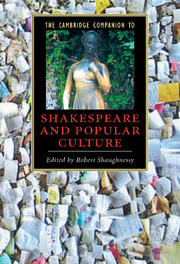Book contents
- Frontmatter
- Introduction
- 1 From popular entertainment to literature
- 2 Shakespeare abbreviated
- 3 Shakespearean stars: stagings of desire
- 4 Shakespeare illustrated
- 5 Shakespeare: myth and biographical fiction
- 6 Narration and staging in Hamlet and its afternovels
- 7 Shakespeare serialized: An Age of Kings
- 8 Musical Shakespeares: attending to Ophelia, Juliet, and Desdemona
- 9 Shakespeare overheard: performances, adaptations, and citations on radio
- 10 Shakespeare on the tourist trail
- 11 Performing Shakespeare in digital culture
- 12 Shakespeare’s popular face: from the playbill to the poster
- Further reading
- Index
- Series List
1 - From popular entertainment to literature
Published online by Cambridge University Press: 28 November 2008
- Frontmatter
- Introduction
- 1 From popular entertainment to literature
- 2 Shakespeare abbreviated
- 3 Shakespearean stars: stagings of desire
- 4 Shakespeare illustrated
- 5 Shakespeare: myth and biographical fiction
- 6 Narration and staging in Hamlet and its afternovels
- 7 Shakespeare serialized: An Age of Kings
- 8 Musical Shakespeares: attending to Ophelia, Juliet, and Desdemona
- 9 Shakespeare overheard: performances, adaptations, and citations on radio
- 10 Shakespeare on the tourist trail
- 11 Performing Shakespeare in digital culture
- 12 Shakespeare’s popular face: from the playbill to the poster
- Further reading
- Index
- Series List
Summary
Shakespeare's transformation from popular entertainer to literary lion was a complex, fascinating process, but it is only one of several plots in the drama of his ever-widening success and influence. Although it is undeniable that Shakespeare has become the Bard of high culture, he has never been exclusively or stably held aloft. Indeed, his story convincingly demonstrates the instability of the line dividing high and low, elite and popular, revealing the multiple (and sometimes colliding) meanings of those terms. Certainly never “unpopular,” Shakespeare worked in a theatre that was attended by a broad cross-section of the London populace and drew on a range of ritual and folk elements; at the same time, his theatre belonged to an emergent protomodern economy that arguably displaced oral and amateur traditions. Through greater attention to marketplace and medial transformations as well as distinct variations among non-elite groups, the last forty years of research have shown the inadequacy of simple, singular definitions of “the Elizabethan stage,” “popular culture” - and even “Shakespeare.” Thus, rather than engage in the potentially “futile endeavor” to “isolate what was purely popular” in the early modern period, this chapter works outward from narrow signifiers to broader contexts, dancing through the evidentiary thickets. It thereby reveals both the importance and rich multiplicity of relationships between Shakespeare and popular culture.
- Type
- Chapter
- Information
- Publisher: Cambridge University PressPrint publication year: 2007
- 7
- Cited by

